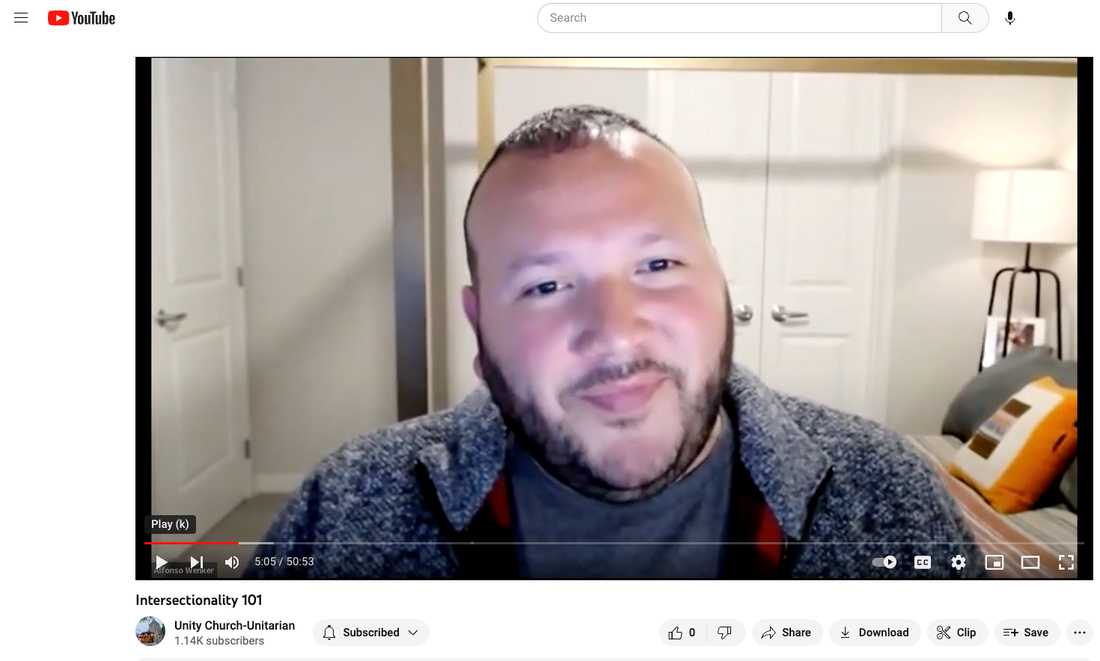|
Lia Rivamonte (she/her), Beloved Community Communications Team
“I'm committed to the rigorous practice of knowing that I don't know and of being open to a multiplicity of possibilities.” Alfonso Wenker, Team Dynamics Receive and Believe. When someone tells you who they are, believe them. It is an invitation to open our hearts and minds a little wider, to accept that the world may not always conform to some of our most deeply-rooted perceptions—in this case, that of gender; that gender is binary and this “fact” is to be regarded as not only sufficient, but a moral truth. Many or possibly, most of us feel able to declare our gender with certainty. We might ask ourselves, what precisely allows us this certainty? As a cisgender female born and raised in a white, male-dominated society, this aspect of my identity (cisgender) has never been questioned, never been subjected to scrutiny, disbelief, or mockery. I may have been treated as less than equal for other reasons: for being in a brown body, for my Asian heritage, for an assumed immigrant status, and native language. But I have never experienced any doubt, or denial when I describe myself as being a woman. (Yes, women have historically been and are still sometimes perceived as inferior human beings by the dominant culture but that’s another story.) I watched the YouTube video of and viewed the slides from the Team Dynamics’ LGBTQ+ Justice session, which was held on Tuesday, February 28, 2023 at Unity. I am sure it would have been a richer experience to be in the room and to participate in the group discussions but it is well worth the time to listen to the recorded session and click through the slides. Alfonso Wenker of Team Dynamics who led the session is an engaging and gifted facilitator. The idea behind “receive and believe,” a phrase Alfonso repeated throughout the session, seems basic to those of us who have never feared rejection, hatred, bias, or outright bodily harm for how we name, describe, and/or present our own sexuality, sexual orientation, and/or gender must live into these words. When it comes to keenly personal descriptors regarding gender and sexual identity, do we take family members, friends, colleagues, neighbors, and strangers at their word? Do we avoid making assumptions based on how they present? Do we make them feel welcome in the spaces we frequent? Do we make an effort to use the terms they have shared that will help make them feel respected, included, and valued? As Alfonso says, “We are all part of the social construction.” It is the construction of a few who are determined to hold onto their power. You have only to turn on the news and listen to any number of politicians who are determined to rein us in by legislating laws that try to dictate who we can and cannot be as sexual beings. Placing limits on and ascribing nonnegotiable labels for gender, sexuality and sexual orientation, or reinforcing the binary, is an extremely powerful tool for controlling our bodies and our existence as full human beings. It is a way for those in power to enjoy comfort and security. Whomever controls the body, controls the wealth, Alfonso says, toward the end of his presentation. Think about it the next time you hear our politicians who espouse a return to “family values” attempting to instill fear in the hearts and minds of the populace about trans affirming care, bathroom usage, and the “danger” of drag performances. Who are they really trying to protect? The truth is, we are not so easily labeled. Picture the antiracist, multicultural, spiritually invigorating community we yearn for: lovely, messy, and full of mystery—a feast for the curious. Please, tell me who you are—give me a minute, and I will tell you who I am.
0 Comments
Erika Sanders, Beloved Community Communications Team A few months ago, Pauline Eichten brought an opening reading to a meeting of the Beloved Community Communications Team. Although written by Bishop Ken Untener in 1979, it’s often called the Oscar Romero prayer because it summarizes the ministry of Archbishop Romero.  This is what we are about: We plant seeds that one day will grow. We water seeds already planted, knowing that they hold future promise. We lay foundations that will need further development. We provide yeast that produces effects beyond our capabilities. We cannot do everything and there is a sense of liberation in realizing that. This enables us to do something, and to do it very well. It may be incomplete, but it is a beginning, a step along the way, an opportunity for God's grace to enter and do the rest. We may never see the end results, but that is the difference between the master builder and the worker. We are workers, not master builders, ministers, not messiahs. We are prophets of a future not our own. The members of our group were energized by the prayer, and by the reminder that we commit to the unknown potential of our work every time we take action to build Beloved Community.
We decided to share it with other Unity Church members and ask about their ability to continue their own antiracism work. How do they embrace the fact that it is work full of ambiguities with no set end-point? Molly Flattum, a Welcome Team member and Spirit Play teacher, and Linda Kjerland, a member of the Congregational Care Team, weighed in. Erika: When you read Romero’s prayer, how did its words resonate with you, and with your activities at Unity Church? Linda: The prayer says it all about keeping at it. I need to continue to prime the pump. As a younger child, I visited my grandparent's farm. Prominent in the yard was a tall rusting hand pump — it produced the first trickles of water only after some effort. I need to continually put yeast in my own dough. I need to listen and to befriend books that provoke, inform, and challenge me. Without repeated infusions, I can tuck in, miss calls for disturbance or misread my own emotions. Molly: The prayer reminds me of how, on the Welcome Team, we give great attention to how we have little snippets of conversation with congregants and visitors on Sundays, and how we try to infuse those small moments with meaning. How do those quick interactions create a space that is welcoming for everyone? What does that space look and feel like when it is engaging in antiracism, or welcoming people with disabilities or other marginalized identities? Erika: How do you grapple with the fact that this work has no point of completion or outcome? Molly: That really resonated with me as a Spirit Play teacher and a parent. As a parent, not having an end-point isn’t so scary, because we know that the work of growth is never-ending. Raising good humans is not about an end point, it is about ongoing action. It’s about raising kids to never be silent. My daughter is a preschooler, and is noticing differences like who has glasses and who doesn’t, and who uses a wheelchair and how they’ll enter a building. We’re normalizing conversations about difference and justice. Children hold me accountable. There’s always more work and learning to do. The idea of having an end goal would almost be limiting, because it might limit what you’re willing to do for the effort. Erika: In your Unity activities, do you find yourself employing the antidotes to white supremacy culture? Linda: I’d like to take time with each characteristic, putting them into intentional discussions within the Congregational Care team as we endeavor to reflect, rethink, and expand for whom and how we show up. My reading on antiracism, including at Unity, has pushed my willingness to see, feel, and heed the indicators of white supremacy culture. Erika: What does the use of the word “prophets” in the final line of the prayer mean to you? Do you see your work as prophetic? Molly: Prophet is a word that lands awkwardly for me. For me, it is more a question of: we are here so temporarily, how do we create a lasting impact? The work we do has to be the hard work, and it has to be part of our daily lives. As a parent, the fact that I’m doing advocacy and justice work–not just for my own sake, but for my children and the whole community — is what makes this holy work. Children help me stay anchored in the moment and keep asking the question, “What’s right in front of me?” It’s about Romero’s seed in the moment and the future. Pauline Eichten, Beloved Community Communications Team I attended the February 22 Intersectionality 101 session led by Alfonso Wenker of Team Dynamics. He described it as a teach-in and began with a definition. Intersectionality is about the identities that intersect in ways that affect how individuals are viewed, understood and treated. Specifically, it’s the “simultaneous, overlapping and compounding nature of multiple forms of injustice and discrimination.” The oppression experienced can operate at the internal, interpersonal, institutional and structural level. The term was initiated by Kimberlé Crenshaw in 1989 as a legal concept related to cases of discrimination. Judges seemed unable to see the overlapping gender and racial discrimination faced by black women, and looked at them as separate issues. Intersectionality provided a way to address the multiple layers of discrimination a person might be experiencing. Rinku Sen, in an essay about intersectionality, points out that it isn’t an identity, it’s a theory, a lens that can help us be more effective in our social justice approach. He wrote:
I was at a recent discussion about the criminal justice system and was struck by a comment from one of the presenters. He shared a definition of reconciliation that he learned in South Africa: reconciliation is removing barriers to authentic relationships. Might our tendency to oversimplify, and assume we know who someone is and what they experience, be one of those barriers? How can we use an intersectional lens to expand the possibilities in our encounters with each other? For more on this topic, see: The final Intersectionality 101 follow up session "Class and Race" will be held on March 14 at 6:30-8:30 p.m., in Parish Hall. Please register!
|
Topics
All
Beloved Community ResourcesUnity Justice Database
Team Dynamics House of Intersectionality Anti-Racism Resources in the Unity Libraries Collection Creative Writers of Color in Unity Libraries The History of Race Relations and Unity Church, 1850-2005 Archives
July 2024
Beloved Community Staff TeamThe Beloved Community Staff Team (BCST) strengthens and coordinates Unity’s antiracism and multicultural work, and provides opportunities for congregants and the church to grow into greater intercultural competency. We help the congregation ground itself in the understanding of antiracism and multiculturalism as a core part of faith formation. We support Unity’s efforts to expand our collective capacity to imagine and build the Beloved Community. Here, we share the stories of this journey — the struggles, the questions, and the collaborations — both at Unity and in the wider world.
The current members of the Beloved Community Staff Team include Rev. Kathleen Rolenz, Rev. KP Hong, Rev. Lara Cowtan, Drew Danielson, Laura Park, Lia Rivamonte and Angela Wilcox. |
